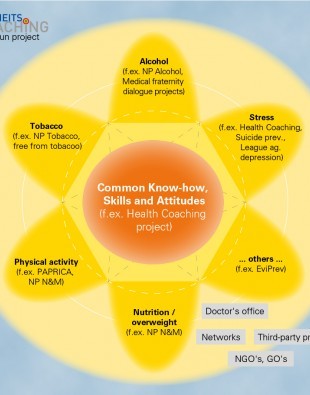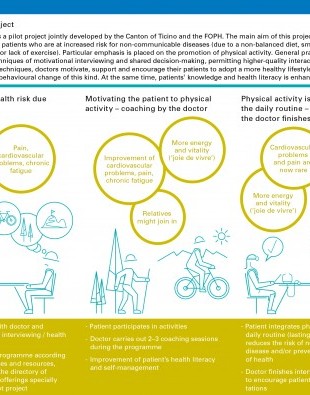
"Girasole" pilot project
Jan. 2017Prevention in healthcare
Girasole. In October 2016, the first patients were enrolled in the canton of Ticino's "Girasole" pilot project. The aim of this two-year project, supported by the Federal Office of Public Health (FOPH), is to reduce risk factors for non-communicable diseases in adult patients consulting their General Pracitioner (GP). Here, physical activity is defined as a key element, and motivational interviewing is central to the intervention. The project is being conducted under the new National Strategy for the Prevention of Non-Communicable Diseases (NCD Strategy), adopted by the Federal Council in April 2016.
The main aim of the "Girasole" pilot project is to promote behavioural change in patients with risk factors for non-communicable diseases (non-balanced diet, smoking, excessive alcohol consumption, lack of exercise), focusing in particular on sedentary lifestyles. According to the results of the 2012 Swiss Health Survey (SHS), the proportion of the adult population that is sufficiently physically active is lower in the canton of Ticino than the average for Switzerland as a whole (60.8 % vs 72.5 %). This canton, supported by the FOPH, decided to make GP practices the preferred setting for encouraging patients to take more exercise and adopt healthy behaviours.
Training for the benefit of the doctor-patient relationship
As patient motivation is a key determinant, the "Girasole" pilot project has drawn on the experience and support of two existing programmes – health coaching, developed by the College of Primary Care Medicine (CPCM), and PAPRICA1 (Physical Activity promotion in PRImary CAre). These two programmes, based on motivational interviewing, have been combined and adapted to the local context in the canton of Ticino to offer GPs customised training, providing the tools they need to promote behavioural change – especially with regard to exercise – in their patients. To this end, a directory of physical activities, covering all the existing offerings in the canton of Ticino, has been compiled and is being made available to doctors and patients. As health coaching serves as a catalyst for the adoption of preventive measures addressing all the risk factors associated with non-communicable diseases, it has been placed at the centre of the "Girasole" model – hence also the name of the project ("sunflower" in Italian). Here, PAPRICA is the "petal" facilitating practice- based promotion of physical activity. One of the fundamental aspects of the "Girasole" pilot project is the switching of roles within the doctor patient relationship: the patient becomes the main health management actor, with the doctor serving as a kind of coach, providing guidance and support. Together, they define the intervention best suited to the patient's resources and needs, and the goals which the patient wishes to attain in the short and medium term. The two interventional approaches utilised in health coaching – motivational interviewing and shared decision-making – help to improve the quality of doctor-patient interactions. Studies have shown that patients are more inclined to take part in a project where the doctor provides coaching rather than merely giving them instructions.
Through the practical knowledge communicated in the pilot project, GPs' skills and role are to be enhanced via their capacity to motivate, support and encourage patients who wish to adopt a more healthy lifestyle; at the same time, patients' knowledge, skills and resources are to be strengthened to improve their own health management. Having developed a continuing education programme in cooperation with health coaching experts, PAPRICA and a group of local GPs, the Ticino Cantonal Health Promotion Agency (SPVS) organised an initial training event on 15 and 16 September 2016 for the 19 GPs interested in participating in the project. The first patients were enrolled at the start of October 2016.
Project evaluation
An evaluation of the pilot project (2016– 2018) is to be carried out by a Lucerne- based consultancy (Interface Politikstudien Forschung Beratung) in collaboration with the University of Applied Sciences and Arts of Southern Switzerland (SUPSI) in Lugano. The evaluation should provide, in particular:
– information on the interventional methodology, the continuing education of GPs, and GP and patient satisfaction (qualitative aspect);
– figures relating to patient support and the behavioural change impact (quantitative aspect);
– an analysis of the cost of the interventions (economic aspect).
The goal is that at least 15 of the 19 GPs participating in the project should each support approx. 20 patients for six months. Data collection will involve two written surveys conducted in these two groups. The evaluation will also cover the patient lists completed by the GPs and the worksheets used for coaching. An initial interim report on the evaluation is scheduled for the second quarter of 2018.
1 The PAPRICA programme is run by the Lausanne University Medical Polyclinic (PMU); the Zurich University Epidemiology, Biostatistics and Prevention Institute; the CPCM; the Lausanne University Institute of Social and Preventive Medicine (IUMSP); the Swiss Sports Medicine Society (SGSM); and the Health Leagues. The office is currently attached to the CPCM.
Contact
Antoine Bonvin
Prevention in Health care Section
antoine.bonvin@bag.admin.ch





